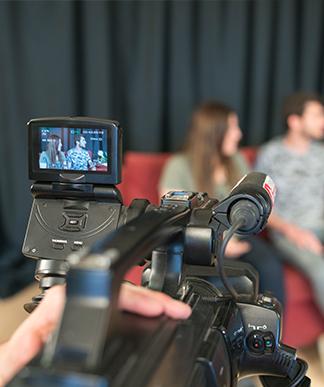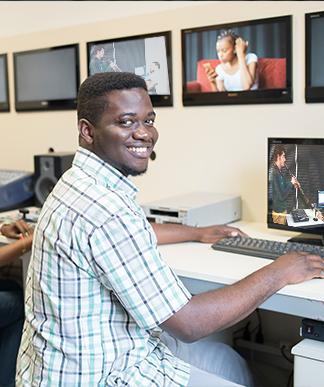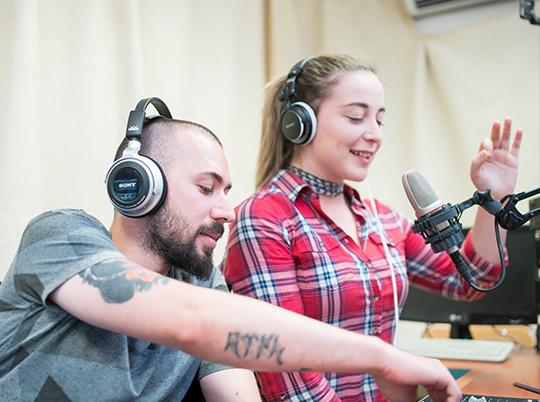


About the Program
The Department of Radio-Television and Cinema aims to educate individuals who can be creative, and are able to grasp and implement radical transformations, adapt to rapidly changing communication technologies and the world, who have an analytical and critical perspective, and are aware of social responsibilities and ethical principles. In addition to the courses that expand theoretical knowledge, the program also offers other courses that bring in the professional information and skills required in the field of radio, television, and cinema. During their education, students will learn how to synthesize information theories and practices and develop analytical thinking skills to develop research strategies. In addition, students are required to complete a 20-day internship at two different times, in order to establish a network in the field, to reinforce practical lessons and to gain experience in their professional life.
Education Opportunities
Students are supported and encouraged during their education to participate in both national and international competitions, as well as to attend events and work in the CIU Radio-TV studios in a variety of technical divisions, such as production and broadcasting. Also, media professionals enlighten students by attending conferences and seminars organized by the department, in order to share their experiences. Students can benefit from the studios by working there as assistants, or to use the space for their extra-curricular studies. CIU FM – the university’s own radio station – broadcasts in the TRNC on the 107.2 MHz frequency, using a fully digital, computer-assisted foundation with all the modern facilities of radio technology. The station produces many programs on a wide range of topics, including education, culture, art, music, and news. Students who have indicated a desire to do radio programs may attend diction training.

Accreditations
Radio, Television and Cinema has been accredited as of January 12, 2023, by the Communication Education Evaluation Accreditation Board (ILEDAK), which is an institution authorized in performing external evaluations and issuing accreditation certificates in the field of communication.
Career Areas
The development of radio, television, cinema, advertising, public relations, visual design and social media institutions and organizations, allied with the increasing needs of local areas of journalism, advertising, and communication agencies, show that our department will serve to an important requirement and function. We will make significant contributions to the future of our country. The students fulfilling course and training requirements successfully can have careers working for radio-television institutions, organizations, and media companies, as producers, directors, scriptwriters, cameramen, fiction operator, picture selectors, management, and so on. In addition, our graduates can complete their postgraduate studies as a start to an academic career.
Contact
Faculty of Communication
Çevik Uraz Center, CU124
Tel: +90 392 671 1111 Extension: 2301
Faculty E-mail: secretary-foc@ciu.edu.tr
Head of Department: Asst. Prof. Dr. Göral Erinç YILMAZ
Head of Department E-mail: gercan@ciu.edu.tr
Compulsory Courses
First Semester
INTRODUCTION TO MASS COMMUNICATION
Course code
COMM101Credit
3Theoretical
3Practical
0Ects
5MEDIA LITERACY
Course code
COMM133Credit
3Theoretical
3Practical
0Ects
5READING AND WRITING SKILLS-I
Course code
ENGL141Credit
3Theoretical
2Practical
2Ects
4INTRODUCTION TO COMPUTERS
Course code
ITEC110Credit
3Theoretical
2Practical
2Ects
4INTRODUCTION TO RADIO
Course code
RTVC101Credit
3Theoretical
2Practical
2Ects
5SOCIOLOGY
Course code
SOCY101Credit
3Theoretical
3Practical
0Ects
5TURKISH LANGUAGE
Course code
TREG100Credit
0Theoretical
2Practical
0Ects
2TURKISH
Course code
TURK100Credit
0Theoretical
2Practical
0Ects
2Second Semester
INTRODUCTION TO NEW MEDIA
Course code
COMM104Credit
3Theoretical
3Practical
0Ects
4READING AND WRITING SKILLS-II
Course code
ENGL142Credit
3Theoretical
2Practical
2Ects
4HISTORY OF CIVILIZATION
Course code
HIST100Credit
0Theoretical
2Practical
0Ects
2LAW AND MEDIA
Course code
ILAW114Credit
3Theoretical
3Practical
0Ects
4PSYCHOLOGY
Course code
PSYC110Credit
3Theoretical
3Practical
0Ects
6INTRODUCTION TO CINEMA AND TELEVISION
Course code
RTVC104Credit
3Theoretical
2Practical
2Ects
5INTRODUCTION TO PHOTOGRAPHY
Course code
RTVC106Credit
3Theoretical
2Practical
2Ects
5MODERN TURKISH HISTORY
Course code
TARH100Credit
0Theoretical
2Practical
0Ects
2Third Semester
ESSENTIALS OF ECONOMICS
Course code
ECON211Credit
3Theoretical
3Practical
0Ects
5ENGLISH FOR RADIO, TV AND CINEMA-I
Course code
RTVC205Credit
3Theoretical
3Practical
0Ects
4FUNDAMENTALS OF RADIO PRODUCTION
Course code
RTVC211Credit
4Theoretical
3Practical
2Ects
6SCRIPTWRITING FOR FILM
Course code
RTVC251Credit
3Theoretical
3Practical
0Ects
5CINEMATOGRAPHY
Course code
RTVC253Credit
3Theoretical
3Practical
0Ects
5EDITING TECHNIQUES
Course code
RTVC265Credit
3Theoretical
2Practical
2Ects
6Fourth Semester
THEORIES OF MASS COMMUNICATION
Course code
COMM212Credit
3Theoretical
3Practical
0Ects
5MEDIA ETHICS
Course code
COMM244Credit
3Theoretical
3Practical
0Ects
4SOCIAL MEDIA IN COMMUNICATION
Course code
COMM254Credit
3Theoretical
3Practical
0Ects
5ENGLISH FOR RADIO, TV AND CINEMA-II
Course code
RTVC206Credit
3Theoretical
3Practical
0Ects
4CAMERA AND LIGHTING TECHNIQUES FOR CINEMA AND TELEVISION
Course code
RTVC214Credit
4Theoretical
3Practical
2Ects
6Area Elective
Course code
RTVCXX1Credit
3Theoretical
3Practical
0Ects
5Fifth Semester
Faculty Elective
Course code
COMMXX1Credit
3Theoretical
3Practical
0Ects
5SUMMER TRAINING-I
Course code
RTVC200Credit
0Theoretical
0Practical
0Ects
5PRODUCTION AND DIRECTING-I
Course code
RTVC315Credit
3Theoretical
2Practical
2Ects
5THEORIES OF FILM
Course code
RTVC321Credit
3Theoretical
3Practical
0Ects
4BROADCAST JOURNALISM
Course code
RTVC331Credit
3Theoretical
2Practical
2Ects
5Area Elective
Course code
RTVCXX2Credit
3Theoretical
3Practical
0Ects
5Sixth Semester
Research Methods for Communication
Course code
COMM366Credit
3Theoretical
3Practical
3Ects
5Faculty Elective
Course code
COMMXX2Credit
3Theoretical
3Practical
0Ects
5OCCUPATIONAL HEALTH AND SAFETY
Course code
OCHS356Credit
3Theoretical
3Practical
0Ects
4PRODUCTION AND DIRECTING-II
Course code
RTVC318Credit
3Theoretical
2Practical
2Ects
5FILM ANALYSIS
Course code
RTVC342Credit
3Theoretical
3Practical
0Ects
3Area Elective
Course code
RTVCXX3Credit
3Theoretical
2Practical
2Ects
5AESTHETICS
Course code
VICD302Credit
3Theoretical
3Practical
0Ects
4Seventh Semester
Faculty Elective
Course code
COMMXX3Credit
3Theoretical
3Practical
0Ects
5SUMMER TRAINING-II
Course code
RTVC300Credit
0Theoretical
0Practical
0Ects
5GRADUATION PROJECT FOR RADIO AND TV
Course code
RTVC413Credit
4Theoretical
2Practical
4Ects
6Area Elective
Course code
RTVCXX4Credit
3Theoretical
2Practical
2Ects
5Area Elective
Course code
RTVCXX5Credit
3Theoretical
2Practical
2Ects
5UNIVERSITY ELECTIVE
Course code
UNIEXX1Credit
3Theoretical
3Practical
0Ects
4Eighth Semester
Faculty Elective
Course code
COMMXX4Credit
3Theoretical
3Practical
0Ects
5GRADUATION PROJECT FOR FILM
Course code
RTVC414Credit
4Theoretical
2Practical
4Ects
7RADIO AND TV MANAGEMENT
Course code
RTVC452Credit
3Theoretical
3Practical
0Ects
5Area Elective
Course code
RTVCXX6Credit
3Theoretical
3Practical
0Ects
5UNIVERSITY ELECTIVE
Course code
UNIEXX2Credit
3Theoretical
3Practical
0Ects
4UNIVERSITY ELECTIVE
Course code
UNIEXX3Credit
3Theoretical
3Practical
0Ects
4Elective Courses
FILM GENRES
Course code
RTVC466Credit
3Theoretical
3Practical
0Ects
5FUNDAMENTALS OF TELEVISION PRODUCTION
Course code
RDTV312Credit
4Theoretical
3Practical
2Ects
6LIGHTING DESIGN
Course code
RTVC442Credit
3Theoretical
2Practical
2Ects
5PHOTOJOURNALISM
Course code
JOUR342Credit
3Theoretical
3Practical
0Ects
5RADIO-TV NEWS WRITING AND REPORTING
Course code
RTVC332Credit
3Theoretical
2Practical
2Ects
5BASIC PHOTOGRAPHY
Course code
COMM231Credit
3Theoretical
2Practical
2Ects
6CONTEMPORARY WORLD CINEMA
Course code
RTVC431Credit
3Theoretical
3Practical
0Ects
5DOCUMENTARY PRODUCTION
Course code
RTVC302Credit
3Theoretical
2Practical
2Ects
5INTERCULTURAL COMMUNICATION
Course code
COMM253Credit
3Theoretical
3Practical
0Ects
5MARKETING RESEARCH IN ADVERTISING
Course code
ADPR429Credit
3Theoretical
3Practical
0Ects
JOURNALISM GENRES
Course code
JOUR454Credit
3Theoretical
3Practical
0Ects
5INTERVIEW TECHNIQUES
Course code
JOUR455Credit
3Theoretical
3Practical
0Ects
5VISUAL LITERACY
Course code
RTVC467Credit
3Theoretical
3Practical
0Ects
5ONLINE JOURNALISM
Course code
JOUR456Credit
3Theoretical
3Practical
0Ects
4POLITICAL COMMUNICATION
Course code
PRAD453Credit
3Theoretical
3Practical
0Ects
3FILM PRODUCTION TECHNIQUES
Course code
RTVC353Credit
3Theoretical
2Practical
2Ects
5TR Applicants
TR Students who are successful in the exams conducted by the Higher Education Council Student Selection and Placement Center (ÖSYM) and are entitled to enroll in our university in line with their preferences can complete the registration process with the necessary documents for registration from our Registration and Liaison Offices throughout Turkey or from the Marketing Directorate on campus.
Click for detailed admission requirements information.
TRNC Applicants
TRNC citizens and TR citizen candidate students who have completed their entire high school education in TRNC. They are placed in undergraduate programs in line with their success in the CIU Student Placement and Scholarship Ranking Exam and the programs they prefer.
Students who are successful in the exam can register from the TRNC Marketing Office.
Applicants can directly apply online to our undergraduate programs using the application portal. Please fill in your details correctly and upload all the required documents listed on the last page of the application form.
Required documents;
- Completed application form,
- Higher/Secondary Certificate or equivalents (e.g. O/A’Level, WAEC/NECO),
- Evidence of English Language competence: TOEFL (65 IBT) or IELTS (5.5). Students without these documents will take the CIU English proficiency exam on campus following arrival,
- Scanned copy of international passport/birth certificate,
- Fully completed and signed CIU Rules and Regulations document (which can be downloaded during the online application).
Cyprus International University provides academic scholarships for its students as an incentive for success, with most students benefiting from 50%, 75% or 100% scholarships or discounted tuition fees. Click for more information.
Tuition Fees are determined at the beginning of each academic year. Candidate students who are entitled to enroll in CIU can learn their fees in line with the Tuition Fee Calculation system.
Program Mission
By contributing to the knowledge, skills and level of competence of our students, as expected in the radio, television and cinema industry; our students are trained as individuals who know how to reach and use information, are open to change and continuous improvement, can produce quality services to increase their career opportunities, and contribute to the development of society and achieve sustainable living. Our innovative approach, which is student-centered, closely follows scientific and technological innovations and the demands of the sector, includes learning based on teamwork, usage of advanced technology and learning focusing on independent learning.
In order to improve and enrich the quality of life of our students, we will provide the highest level of education and training and gain experience through application and research activities and the continuous improvement of real life experience. Our graduates will be accepted in the industry and society with the knowledge, skills and ethical values they have.
Students;
PO1: know the stages of production of radio, television and cinema productions, have the ability and competence to plan and implement work in the stages of production.
PO2: know the basic working principles and operations of audiovisual production tools, have the ability to effectively use these tools in the production process of radio, television and cinema productions.
PO3: have knowledge about theories in the field of radio, television and cinema.
PO4: know the historical development process of radio, television and cinema in the world and in Turkey.
PO5: know the legislation governing the field of radio, television and cinema, national and international professional organizations and ethical principles.
PO6: know the types of programs in radio and television broadcasting.
PO7: know the genres and trends of Cinema.
PO8: know the methods of analyzing and evaluating messages in audio and visual environments.
PO9: prepare, design and implement project proposals for radio, television and cinema projects suitable for different broadcasting environments.
PO10: know the techniques of writing scripts, have the ability to write scripts and prepare a shooting script.
PO11: have the ability to make sound and image editing, apply it in the fields of digital sound design, image design and visual effects use in field-specific content production.
PO12: have the ability to consider, analyze and evaluate the social, economic, political, cultural, etc. effects of media content in written, audio and visual environments from a critical point of view.
PO13: have the competence to design and produce programs and/or make films in the field of radio, television and cinema.
PO14: are proficient in the basic principles of Image aesthetics, visual design, cinematographic language/expression and composition.
PO15: have knowledge about Radio and Television management.
PO16: know the standards in field-specific products.
PO17: are proficient in collaborating for joint work and production in the field of radio, television and cinema.
CIU Radio, Television and Cinema Program aims to train graduates who have;
PEG1: Sufficient interdisciplinary knowledge in social and cultural issues related to communication and radio, television and cinema, and have the ability to use this knowledge in the fields of radio, television and cinema,
PEG2: Knowledge about scientific, social, economic, legal and political developments,
PEG3: Gained the ability to apply research, plan, conversion of a product specific to the field of radio, television and cinema with a creative and critical approach,
PEG4: The skills to collaborate, work harmoniously and efficiently as a team for joint work and production in the field of radio, television and cinema,
PEG5: Knowledge about the legal regulations and applications related to the field of radio, television and cinema.
PEG6: The ability to apply the principles of ethics and professional ethics in their studies and are aware of their responsibilities,
PEG7: The awareness of their responsibilities, and are sensitive to the universal and social impacts, and legal consequences of issues, such as human rights, cultural diversity, environmental issues, public interest and public service, regarding their professional studies related to the field of radio, television and cinema,
PEG8: The knowledge and experience about business practices, and the ability to behave with an entrepreneurial and innovative approach awareness,
PEG9: Successfully completed at least two courses from other disciplines in their educational programs,
PEG10: The ability to use relevant information about their field in occupational health and safety issues,
PEG11: The ability to communicate effectively orally and in writing in at least one foreign language related to their field (at the General Level of the European Language Portfolio B1).